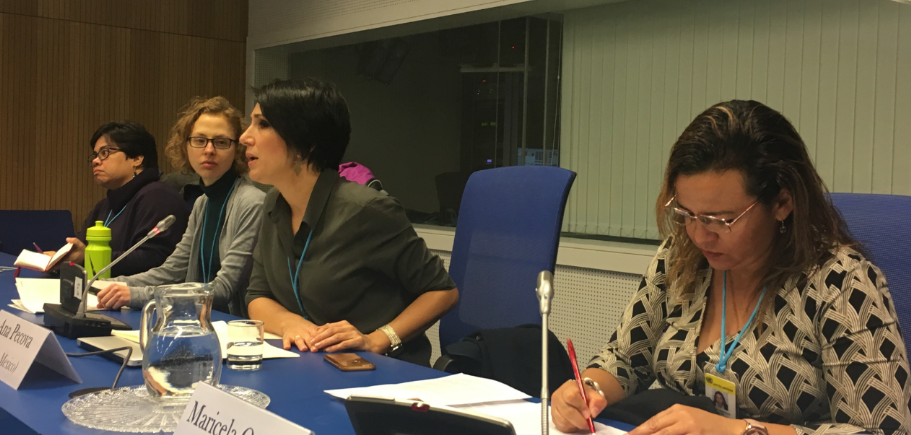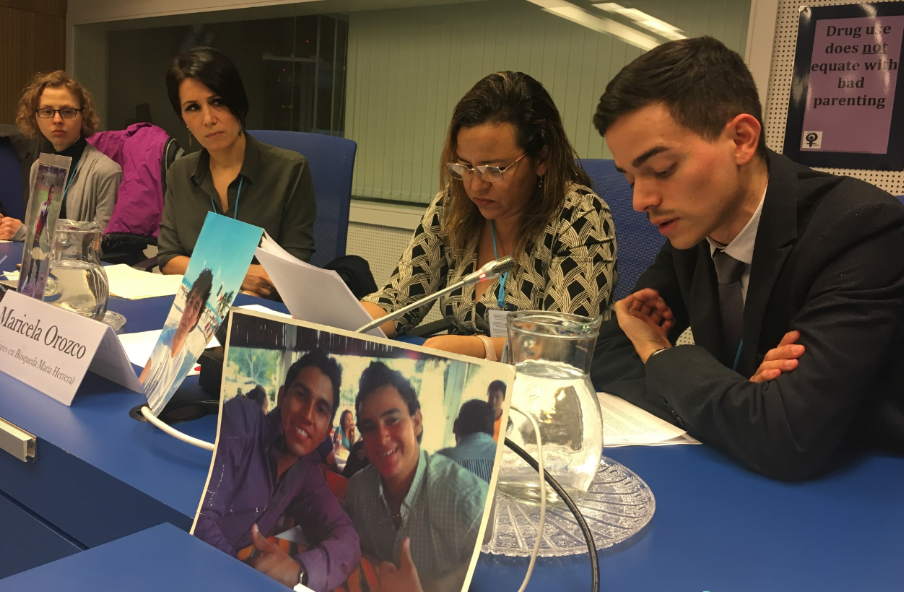Organized by Centro de Estudios Legales y Sociales, the International Drug Policy Consortium, the Women and Harm Reduction International Network, the Washington Office on Latin America and Equis Justicia para las Mujeres. Presentations will focus on the challenges faced by pregnant women who use drugs, the over-incarceration of women for drug offences in Asia, and the violence and hardship faced by women affected by the war on drugs in Mexico.

Ana Pecova, Equis Justicia para las Mujeres (Mexico): Welcome everyone. We work to promote access to justice for women in conflict with the law. The main reasons for women’s incarceration are drug related crimes in Mexico. It has risen by more than 100% over recent years. Not the only impact on women. Gender is an important factor for drug policy analysis. The impact is different for women and this must be taken into account. I have three amazing women with me here today to explain what these differences are in how women experience drug policies.
Claire Mawditt, Women and Harm Reduction International Network (UK): Where pregnancy and bad drug policy collide: issues facing women who are pregnant and use drugs. We are a global network of members and we are diverse. Of the 83 million women who use illicit drugs globally, 1.7% are pregnant. Criminalisation of pregnant women who use drugs underpins many of the issues that they face. Imposing punitive measures has had a disproportionate effect on women drug users. Pregnant women who use drugs face access issues, for example they face lack of access to medical services. Punitive policies deter women from accessing services, or they may not exist. This has implications on the health of women and their babies. In terms of violence; police officers do not see women who use drugs as victims of domestic violence, and women who use drugs are less likely to report violence and simultaneously more likely to experience it. They are also less likely to be believed.
Women who use drugs face stigma and hostile attitudes from society, for example the attitude of: ‘If you’re poor, you’re a bad parent.’ Women who use drugs may lose the support of some social networks leading to more discrimination. Drug use does not equate to bad parenting. The sexual and reproductive rights of women who use drugs are violated. They may be forced to have abortions. They may be denied birth control or coerced into sterilisation. Children can be removed from mothers who are good parents. We call for the decimalisation of mothers/pregnant women who use drugs. We ask you to support the Norway and Sweden resolution on mother to baby HIV and BBC transmission. We ask you to engage with civil society organisation at the CND, to work together to tackle these issues. Only 17% of countries have data showing provision of anti-viral therapy for pregnant women who use drugs. We ask you to support the Canadian resolution on stigma. We ask you to speak with pregnant women who use drugs in your countries. This year we call for member states to implement drug policies decriminalising pregnant women who use drugs. Nearly 80% of women in jails are mothers accused of minor offences.
Mary Catherine Alvarez, StreetLawPh / IDPC Consultant (Philippines): I am consultant for the IDPC and I am coordinating a project in southeast Asia on women and incarceration. The goal of the project is to reduce incarceration of women for drug offences. We also want to have an increased understanding of the profiles of women incarcerated and understanding of sentencing practices. We have research and workshops and have consultations with stakeholders. It is being implemented in Indonesia, the Philippines and Thailand. These 3 countries are implementing this together to draw a picture of the situation of the women incarcerated in southeast Asia. We have some initial findings. In October-November last year we collected qualitative research in Indonesia. We went to see four prisons in Indonesia and collected data from 307 women. We found that almost all women did not know which article in the law they were proven guilty. Most of the women only looked at the sentence the judges gave to them. Around 30% of the women were sentenced for using drugs, followed by selling, some were sentenced because they knew others had committed offences and they did not tell the police. In October 2017 65% of women incarcerated were for drug offences. The overcapacity rate is varied, but most are overcrowded – one by over 700%. These are initial findings and we are about to do more qualitative research. In the Philippines, there is some available government data, and we also interviewed 20 women. In September 2017 the majority of women were in jail for possession or sale of drugs. Paraphernalia possession is also considered an offence. There is a dramatic increase in the incarceration of women during 2016-17, do I need to tell you why? It has increased to 21,000 women since 2016 when our government started its war on drugs. 60% of the country’s female prison population are incarcerated for drug offences. In Thailand, the data shown in the World Prison brief shows 80% of women in prison are incarcerated for drug offences – 78% are first time offenders. Data gathering is still ongoing. I would like to thank our researchers on the ground.
Ana Pecova, Equis Justicia para las Mujeres (Mexico): In Mexico, women are considered for crimes that carry harsher sentences. in comparison to men, which leads to harsher sentences for the same level of offences. Thank you. We move on to Maricela.
Maricela Orozco, Familiares en Búsqueda María Herrera (Mexico): I am here because I suffered the kidnapping of my son who was only 19 years old. That same day my son and son in law were killed. My son disappeared in the framework of the violence and impunity in Mexico. This has resulted in an increase in human rights violations. 30,000 people have disappeared since 2006. In the case of these murders we know state agents and non-state agents have been involved. Judges cover up for organised crime. Since my fight to find my son started, I have since joined other families to start our organisation for families who have people who have disappeared. I went from searching just my son to all disappeared people in Mexico. I have participated in different activities to search for people who are living and for mass graves. I have helped developed a new law for missing people and contributed to the resistance to the law of security, which was recently passed. I have participated in efforts to adopt a strategy to stop the war on drugs.
Only a few months ago I found the body of my son. Apart from the harms of the war on drugs and what it has entailed for families like mine, defending human rights in this context is very dangerous. Many of us have been killed searching for family members. Searching makes us an uncomfortable element for criminal actors and for the state because we shed light on their links to organised crimes. When the former president declared the war on drugs is when we see the rates of criminalisation increase. They are framed as deserving what they get. In the search for my son I visited different prisons and observed that prisons are brimming with people accused of non violent drug offences. The cycle of impunity and corruption has not allowed us to find all of our disappeared ones. It is so urgent to change the drug policy strategy and protect human rights.
Ana Pecova, Equis Justicia para las Mujeres (Mexico): Since the war on drugs started in Mexico, 200,000 people have been killed. It has mainly been the women who are responsible for finding their loved ones.
Question from the floor: You have recently put out a report on this issue, maybe you could tell us more about it? The relationship between women and violence.
Ana Pecova, Equis Justicia para las Mujeres (Mexico): Drug related crimes are the main reason for incarceration. The women have some shared characteristics but we cannot draw too many generalisations. The main is they come from poor marginalised contexts and have low levels of education. Nearly 50% have experienced sexual violence and 90% are mothers. We stress the impact of their incarceration on the effected communities. Practically none of them were armed when they were detained. We are trying to push for alternatives to incarceration: so they can serve their sentences in another manner.
It is also clear that it is not only drug policies that have a differentiated impact on women. Different kinds of women experience different impacts of drug policies. For example, migrant groups of women, these additional aspects of disadvantage make them particularly vulnerable. Women who have disabilities, transwomen or HIV positive, women who are mothers or who are pregnant will experience drug policies in diverse ways. Intersectionality needs to be included in the analysis around this problem.
Women are not just victims when they go to prison but also the women who are connected to those in prison. A study documented that when a man goes to prison, it is the women who have the burden of caring for him. It costs around 300 dollars to have a person in prison in Mexico. You have to pay for everything for them in the prison. Women take up jobs just to maintain men in prison. We also do not have enough prisons for women. This also adds to the burden, women may serve sentences far from home which complicates their situation further. We must insist on gender being included in all aspects of drug policy.
Copyright: Marie Nougier, IDPC
Marie Nougier, IDPC: We have talked a lot about civil society as drivers for change. Could you tell us more about mobilising for change? How are they incorporated?
Question from the floor: What actions can people take who are hearing these stories for the first time?
Mary Catherine Alvarez, StreetLawPh / IDPC Consultant (Philippines): Drug policy reform is barely present in the Philippines because it is dangerous to openly call for reform. There are organisations, but we try to do it as quietly as we can, you might be targeted as defenders of criminals. Many of the victims who were killed were women. It is hard to get gender segregated data. It is important to engage with the women’s organisations. The rights of women who use drugs should not be separated. Should include the rights of incarcerated women.
Claire Mawditt, Women and Harm Reduction International Network (UK): From HRI our strength is we are global. We are continuing to grow as an organisation and we are aligning with other Civil Society Organisations and I think by joining together and sharing best practices is a way we can tackle these issues from a gender perspective. You can join our network, there is always something people can contribute, especially if you have specific skills. We also ensure representation from women who use drugs are included in the network.
Maricela Orozco, Familiares en Búsqueda María Herrera (Mexico): We currently do searches for mass graves and we receive no funding, so donations are a key way you can support our cause.
Ana Pecova, Equis Justicia para las Mujeres (Mexico): I would like to close reiterating that women’s rights organisations must start taking up these issues. There are few feminist organisations specifically working for women in prison.

